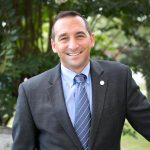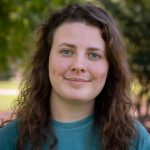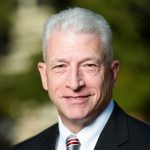Council Hosts 15th Annual Excellence in Community Engagement Awards
Diane Kennedy-Jackson
Publications Coordinator
Division of Community Affairs
The Council on Community-Based Partnerships hosted its 15th Excellence in Community Engagement Awards April 20–22. These annual awards recognize outstanding engaged scholarship work, which combines the familiar traditions of teaching, research and service in equitable partnerships with communities external to the campus, with the goal of creating sustained, positive change in both the community and the academy.
“The annual awards recognition aims to bring deserved attention to the remarkable individual efforts that embody the endeavors of the Council on Community-Based Partnerships,” said Dr. Peter Hlebowitsh, dean of the College of Education and chair of the executive committee of the Council. “It is simultaneously a celebration and a serious acknowledgment of the innovative and life-reaching work being conducted by and through this body. It is also an opportunity to fête our wonderful partners.”
The first day of this year’s event took place on a virtual platform and featured highlights from the Student Community Engagement Center and recognition of Leadership Academy participants and anchor organizations, as well as poster presentations and the announcement of the 2021 Zachary David Dodson Memorial Endowed Scholarship recipient.
Chris Brewster, a Pinson, Alabama native, received the Dodson Scholarship. A sophomore accounting major, Brewster has worked at the Center for Community-Based Partnerships (CCBP) since his freshman year, helping with both the Global Café initiative and the Center’s Vision Days program.
Research poster presenters and their projects are:
Emefa Butler, founder of Choice, Inc., Two Miles on Twelve,
Baili Gall, doctoral student in the Department of Anthropology, A Community-Engaged Approach to Teaching Nutritional Anthropology: A Collaboration with Schoolyard Roots,
Zev L. Goldberg, undergraduate student in the Department of Health Science, An Anchor Institution’s Asset-Building Approach to Promoting Homeownership,
Lillian Slaughter, undergraduate student in the Department of Biology, Community-Led Maternal and Infant Health Research Needs Assessment,
Kate Taylor, master’s student in the College of Communication and Information Sciences, Vision Days Legacy, Connecting First-Year Undergraduates to the Community, and
Andrea Ziegler, director for community education, CCBP, Community Engagement to Boost Virtual Professional Development in the Parent Teacher Leadership Academy.
The second day of the program, also held virtually, included the announcement of seed fund recipients for 2021, as well as reports from 2020 recipients and travel fund recipients who traveled in 2020 just prior to the pandemic.
Recipients of 2021 seed fund awards are:
Tracey Hodges, assistant professor, elementary education program, for Increasing Teacher Self-Efficacy for Writing Instruction Through a Professional Development Focused on Ani-Racist Writing Instructional Practices, and
Haley Townsend, instructor, Capstone College of Nursing, for Empowering Young Women in Rural Alabama through Menstrual Hygiene Outreach.
Recipients of 2020 seed fund awards shared their work via prerecorded videos and also participated in the Zoom meeting live to answer questions. They are:
- Carol Donovan, professor, literacy education, and director, Belser Parton Literacy Center, for Young Authors Program and Extravaganza for Improved Writing Achievement and Community Engagement,
- Holly Horan, assistant professor, anthropology, for Measuring the Impact of Community Doula Care in Central Alabama, and
- Betty Key, assistant professor, Capstone College of Nursing, for Panola Munch and Learn.
While travel funds are not currently being awarded due to travel restrictions as a result of the pandemic, those who joined the second day of the celebration had the opportunity to hear from two UA students, Marvin Adams and Matteo Zengaro, who previously received travel support and traveled pre-pandemic to Elon University for Campus Compact’s Pathways to Achieving Civic Engagement Conference. (Travel funding will resume when travel restrictions are lifted. For more information, visit http://ccbp.ua.edu/travel-funds/).
The final day of the awards program occurred in a hybrid setting, with award recipients and presenters participating in a socially distanced and masked in-person event in the Bryant Conference Center Rast Room, while others viewed the program via a live Zoom feed.
Dr. Ed Mullins, retired dean of the College of Communication and Information Sciences and director of research and communication at CCBP, welcomed those in attendance. Dr. Stuart R. Bell, UA president, and Dr. James T. Dalton, executive vice president and provost, congratulated award recipients and shared their thoughts on the importance of engaged scholarship.
Dr. George Daniels, associate professor of journalism and creative media and chair of the Excellence in Community Engagement Recognition Committee of the Council, shared a recap of the first two days of the program and then invited Dr. Rebecca Allen, professor and chair of the Department of Psychology and chair of the Council’s Faculty Teaching and Research Support Committee, to announce the recipients of community engagement graduate fellowships for the upcoming academic year.
“The committee had the distinct pleasure of reviewing and selecting these exceptional projects,” said Allen. “We are forever grateful to Dr. Susan Carvalho, associate provost and dean of the Graduate School, for providing the funding to make these graduate fellowships possible and for her continued support of this program. Dr. Carvalho had a prior commitment today. We are grateful that Dr. André Denham, associate dean for graduate academic affairs, is able to join us to congratulate our award recipients.”
Graduate fellowship award recipients for 2021 are:
Heather Gunn, doctoral student Alexandra Fischer, for Sleep of Mothers in Pickens County/Psychosocial and Sleep Health Needs of Mothers of Infants and Young Children of Pickens County,
Joy Douglas, doctoral student Phatt Thaitrong, for Supporting Brain Injury Survivors and their Caregivers: A Community Engagement Project,
Laura Hopson, doctoral student Gloria Abura, for UA-SMART Student Health Partnership to Promote Student Health and Wellbeing through Community-Engaged Intervention and Evaluation, and
Susan White, doctoral student Alexis Brewe, for Community-Based Programming for Transition-Aged Youth with Autism.
Recipients of Excellence Awards for Outstanding Community Partner-Initiated Engagement Effort include:
League of Women Voters of Greater Tuscaloosa, Ms. Carol Pricket, and
STEM Showcase, Dr. Yuping Bao, Karrie Curry and Andrea Ziegler
Recognized for Outstanding Student-Initiated Engagement Effort are:
High School Stem Innovation Course, Gabi Dwyer, Jessi Gentrup, Josh Lambert, Phillip Myers, Payti Harrison and Drew Cheek, and Elizabeth Jernigan, instructor of marketing,
Leave It To Us, Michael Arundel, Lauren Shilling and Abbie Ray, and UA graduate Ibukun Afon, and
Vote Everywhere UA, Samuel Reece
Recipients of Excellence Awards for Outstanding Faculty/Staff-Initiated Engagement Effort include:
Two Miles on Twelve, Dr. Michael Callihan, assistant professor, Capstone College of Nursing,
SLIS Book Bonanza for the Black Belt (and Beyond), Dr. Jamie Campbell Naidoo, Foster-EBSCO Endowed Professor, School of Library and Information Sciences, and
Political Primaries & Caucuses course, Dr. Cynthia Peacock, assistant professor, Department of Communication Studies.
Four individuals received Distinguished Community-Engaged Scholar Awards. These awards are presented to individuals with a record of sustained, distinguished and superb achievement in public service and engagement in community-based partnership efforts that have made outstanding contributions to the quality of life in Alabama. The award recognizes individuals who have gone above and beyond in support of one or more community-based partnership projects or whose work demonstrates superior understanding, appreciation and support of community-based partnership efforts. The award has previously been presented to a community partner, a student, and a faculty or staff member. For the first time, the latter category has been split to include two awards: one for a faculty member and one for a staff member.
The 2021 Distinguished Community-Engaged Scholar award recipients are:
LaKeda Smith, executive director of the Benjamin Barnes YMCA in Tuscaloosa, Community Partner,
Jake Peterson, a first-year doctoral student in the College of Education’s kinesiology department, Student,
Martha Crowther, associate dean for research and health policy in the College of Community Health Sciences, Faculty, and
Pamela Young, director of community engagement and economic development in the College of Arts and Sciences, Staff.
Each year one individual receives the Outstanding Special Achievement in Community Engagement Award. Dr. Peter S. Hlebowitsh is the 2021 recipient, in recognition of his outstanding campus, community, state and national leadership and his support of community-engaged scholarship as dean of the College of Education and chair of the executive committee of the Council on Community-Based Partnerships, and for his tireless passion for improving the quality of life in communities while supporting valuable research and learning opportunities for faculty, students, staff and community partners.
For more information on the 2021 awards, visit http://ccbp.ua.edu/fifteenth-annual-excellence-in-community-engagement-awards/.
To view each day of the awards program visit:
Day 1: https://youtu.be/Rj0bkdriaD8
Day 2: https://youtu.be/XTI4tpbrydQ
Day 3: https://youtu.be/Ooj9fvhTwzs




